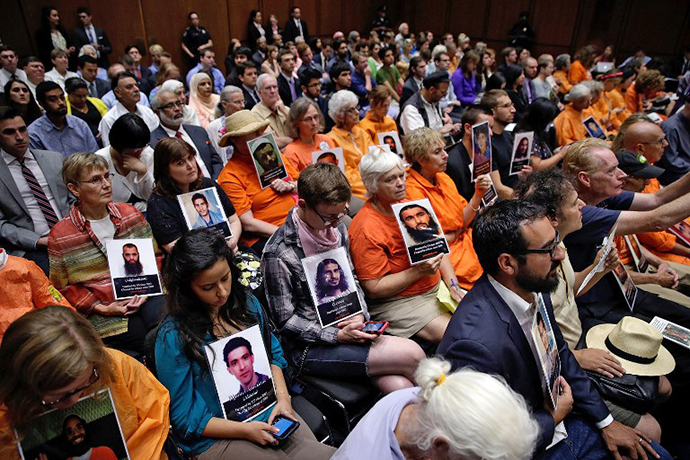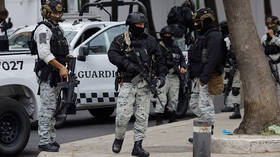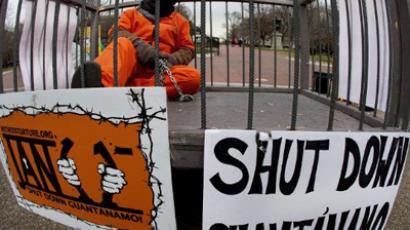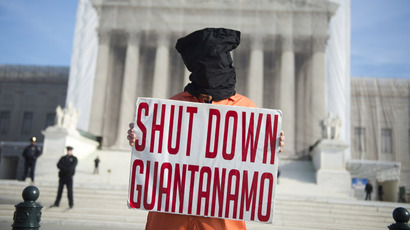White House skips Senate’s first Gitmo hearing in 5 years
Though president Obama recommitted to closing the detention center at Guantanamo Bay in May, the first Senate hearing in five years held to discuss precisely that topic was notable for the lack of any White House witnesses.
On Wednesday, the Senate held its first hearing since 2009 on
whether to shut down Guantanamo. It was chaired by Senator
Dick Durbin, D-Ill, one of the strongest proponents of the
facility’s closure, who came up with a suggestion of how to do
just that.
"We can transfer most of the detainees to foreign countries.
And we can bring the others to the United States, where they can
be tried in federal court or held under the law of war until the
end of hostilities,” Durbin said as cited by AP.
This vision seemed unacceptable to some of the Republican
Senators, as RT’s Liz Wahl reported from the hearing.
“We did hear some concern now from Senator Ted Cruz [R-Texas]
about what would happen if this base were to close, where these
detainees were going to be transferred if this base does in fact
shut down. Certainly there’s fear there among several Republicans
concerning what exactly these detainees would do, where they
would be sent. Certainly people don’t want them to be sent on US
soil,” Wahl said.

The fears are shared by the majority of the House of
Representative members. The day before the Senate hearing, the
House voted 247 to 175 against the amendment, which would have
allowed Guantanamo closure to commence.
That makes it even more difficult for the Obama administration to
act on the president’s promise to do away with the prison, to
which Obama once again pledged commitment in May, during a major
speech outlining US defense topics, including ongoing drone
strikes in Afghanistan, Yemen and other regions of the world.
The Obama administration, however, declined an invitation to send
a witness to Wednesday’s Senate hearing to bolster its case to
shut down the facility, according to an aide for Senator Dick
Durbin who spoke with The Daily Beast.
Both the hearing as well as Obama’s renewed effort to close
Guantanamo come as detainees continue on a hunger strike in
protest of their indefinite detention as well as conditions at
the prison. The force-feeding of the hunger strikers has in
particular become a magnet for criticism by those who argue for
the facility’s closure and a growing number of human rights
advocates.
“I believe it violates international norms and medical ethics.
And at Guantanamo, it happens day after day and week after
week,” Senator Dianne Feinstein, D-Calif., said at the
hearing of the continued force-feedings.

Feinstein, who requested in April that the White House resume cleared prisoner transfers out of Guantanamo, has in the last few months become one of the most visible proponents of drawing down operations at the center.
It was reported at the hearing that each of the 166 Gitmo
detainees cost the US budget $2.7 million annually, which
Feinstein described as “a massive waste of money,”
according to Reuters.
Senators Durbin and Feinstein, the latter being chair of the
Senate Intelligence committee, urged the administration to
outline a process for closing the detention center in July. The
two senators also urged Obama to direct the Department of Defense
to stop conducting large-scale force feeding at the detention
center.
Only a few days before the request made by the two senators a
judge had ruled that only Obama himself had the power to
intervene in halting the force-feeding of hunger strikers.
Of the 166 prisoners who still remain in the camp, 86 have
already been cleared for release. However, owing to political
opposition in Congress, early attempts by the Obama
administration through the Department of Justice during its first
term to transfer prisoners to other locations failed.
“I’ll be the first to acknowledge that the administration
could be doing more to close Guantanamo,” Durbin said on
Wednesday, going on to explain that he and Feinstein had met with
“senior White House officials” to discuss how to transfer
detainees out of Gitmo.

“The president has been clear that he wants Gitmo closed, and
the national security waiver provides an avenue to start clearing
transfers,” said C. Dixon Osburn, the director of Human
Rights First’s law and security program. “If the White House
believes it does not have the authority, they should tell
Congress what authority they need and make it to the Hill and say
so.”
A lawyer for a Guantanamo detainee, Cindy Panuco, who spoke to
RT, said it was commendable that the Senate was finally holding
hearings concerning the base “after nearly five years of
silence,” but she would have liked to finally see more action
from those in power.
“What we heard today were not any concrete steps the Congress
or the president are going to take to close the base, but we
heard more talk, which is heartening that the base will be
closed. But at this time we would like less talk and a little bit
more action as President Obama still has not appointed an envoy
in the Department of Defense to effectuate the closure of the
base and there still not being designated separate and alternate
site for the prisoners that will be transferred,”
Panuco said.














